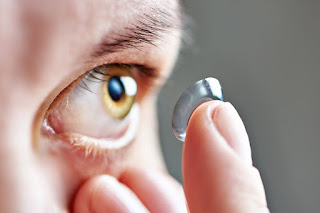Essential Tips for First-Time Users of Contact Lenses
Are you considering making the switch from glasses to contact lenses? Or perhaps you've already taken the plunge and are navigating the world of contact lens wear for the first time. Either way, adjusting to this new method of vision correction can be both exciting and challenging. To ensure a smooth transition, here are some essential tips for first-time users of contact lenses.
Important Tips For First-Time Users of Contact Lenses
Consult with an Eye Care Professional: Before you start wearing contact lenses, it's crucial to have a comprehensive eye exam and consultation with an eye specialist. They will determine your prescription, assess your eye health, and provide guidance on the best type of contact lenses for your needs.
Follow Proper Hygiene Practices: Cleanliness is key when it comes to handling contact lenses. Always wash your hands thoroughly with soap and water before touching your lenses. Avoid using oily or scented soaps, as they can leave residue on your hands that may transfer to your lenses and irritate your eyes.
Learn the Correct Insertion and Removal Techniques: Inserting and removing contact lenses can seem daunting at first, but with practice, it becomes second nature. Your eye care professional will demonstrate the proper techniques, which typically involve gently holding your eyelids open and placing the lens directly onto your eye. Remember to avoid blinking excessively while inserting the lens.
Start Slowly and Build Up Wear Time: When you first start wearing contact lenses, it's normal for your eyes to need some time to adjust. Begin by wearing your lenses for just a few hours each day, gradually increasing the wear time as your eyes adapt. Avoid wearing your lenses for extended periods initially to prevent discomfort and dryness.
Listen to Your Eyes: Pay attention to any discomfort or irritation while wearing your contact lenses. If you experience redness, itching, or blurred vision, remove your lenses immediately and consult your eye care professional. Ignoring symptoms could lead to complications such as corneal abrasions or infections.
Stick to Your Replacement Schedule: Contact lenses need to be replaced regularly to maintain eye health and ensure optimal vision correction. Whether you're using daily disposable lenses or monthly disposables, adhere to the recommended replacement schedule provided by your eye care professional. Avoid wearing lenses beyond their recommended lifespan to prevent bacterial buildup and potential eye infections.
Keep Your Lenses Clean and Store Them Properly: Proper lens care is essential for maintaining the clarity and comfort of your contact lenses. Clean your lenses daily using a multi-purpose solution recommended by your eye care professional. After cleaning, store your lenses in a clean case filled with fresh solution, and replace the solution every time you wear your lenses.
Avoid Water Exposure: Contact lenses should never come into contact with water from sources such as tap water, swimming pools, or hot tubs. Water contains microorganisms that can adhere to your lenses and cause serious eye infections, including Acanthamoeba keratitis. Always remove your lenses before swimming or showering.
Keep Your Eyes Moisturized: Contact lens wear can sometimes lead to dry eyes, especially if you spend a lot of time in air-conditioned or heated environments. Use lubricating eye drops recommended by your eye care professional to keep your eyes moist and comfortable throughout the day.
Attend Regular Follow-Up Appointments: Schedule regular follow-up appointments with your eye care professional to monitor your eye health and ensure that your contact lenses are providing optimal vision correction. These appointments also give you the opportunity to discuss any concerns or issues you may be experiencing with your lenses.
In conclusion, wearing contact lenses for the first time requires patience, diligence, and proper care. By following these essential tips and consulting with your eye care professional, you can enjoy clear vision and comfortable lens wear without compromising your eye health.
And if you’re considering cataract eye surgery in Mumbai, it’s important to consult with an experienced ophthalmologist to discuss your options and ensure the best possible outcome for your vision.




Comments
Post a Comment